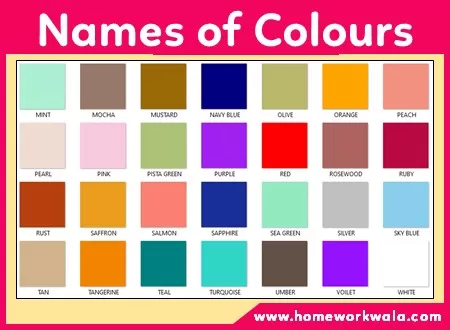Skip to contentList of 60+ Colours Names in English with colour example
| SN | Names of colours | Example |
|---|
| 1 | Amber |  |
| 2 | Aqua |  |
| 3 | Arctic Blue |  |
| 4 | Ash |  |
| 5 | Azure |  |
| 6 | Beige |  |
| 7 | Black |  |
| 8 | Blue |  |
| 9 | Bronze |  |
| 10 | Brown |  |
| 11 | Brunette |  |
| 12 | Burgundy |  |
| 13 | Charcoal |  |
| 14 | Coffee Brown |  |
| 15 | Coral |  |
| 16 | Cream |  |
| 17 | Crimson |  |
| 18 | Cyan |  |
| 19 | Dark Green |  |
| 20 | Emerald |  |
| 21 | Fuchsia |  |
| 22 | Garnet |  |
| 23 | Grapevine |  |
| 24 | Gray |  |
| 25 | Green |  |
| 26 | Indigo |  |
| 27 | Ivory |  |
| 28 | Jet black |  |
| 29 | Lavender |  |
| 30 | Lemon Yellow |  |
| 31 | Lilac |  |
| 32 | Lime Green |  |
| 33 | Magenta |  |
| 34 | Maroon |  |
| 35 | Mauve |  |
| 36 | Mint |  |
| 37 | Mocha |  |
| 38 | Mustard |  |
| 39 | Navy Blue |  |
| 40 | Olive |  |
| 41 | Orange |  |
| 42 | Peach |  |
| 43 | Pearl |  |
| 44 | Pink |  |
| 45 | Pista Green |  |
| 46 | Purple |  |
| 47 | Red |  |
| 48 | Rosewood |  |
| 49 | Ruby |  |
| 50 | Rust |  |
| 51 | Saffron |  |
| 52 | Salmon |  |
| 53 | Sapphire |  |
| 54 | Sea Green |  |
| 55 | Silver |  |
| 56 | Tan |  |
| 57 | Tangerine |  |
| 58 | Teal |  |
| 59 | Turquoise |  |
| 60 | Umber |  |
| 61 | Violet |  |
| 62 | Cherry Red |  |
| 63 | White |  |
| 64 | Yellow |  |
































































